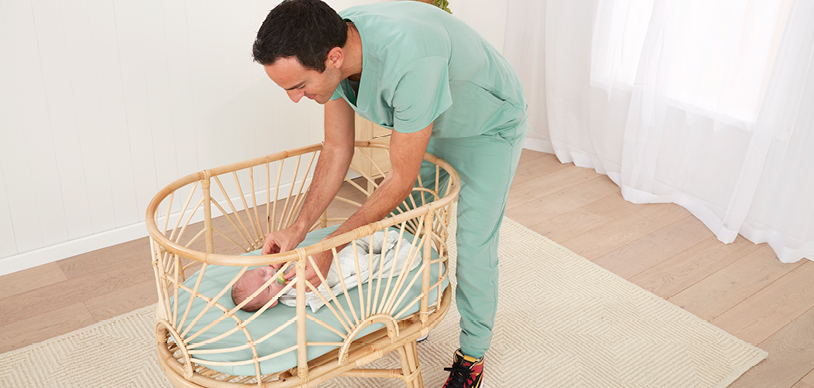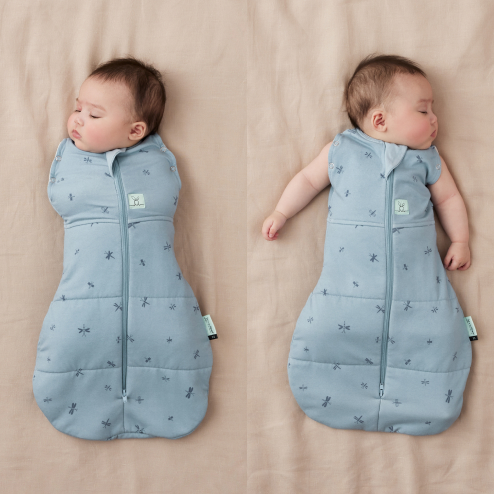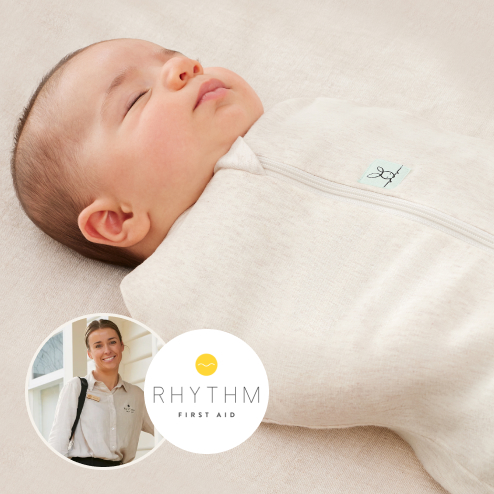
To celebrate Father's Day, we sat down with our friend Dr Golly to chat about Dad and the non-birthing parent's role in a newborn’s life. Dr Golly (Dr Daniel Golshevsky) is a Melbourne-based paediatrician and father of three. Specialising in unsettled babies and poor sleep, Dr Golly developed this program through his work with thousands of babies over a decade of practice. With a focus on empowering parents and protecting mothers, Dr Golly turns up the volume of that innate parental instinct to maximise parents' understanding of their baby's cues and bring everyone closer to a full night's sleep.
Let's jump into it. Happy Father's Day, Dr Golly!
Thank you, wishing a very happy fathers' day to all the grandfathers, experienced fathers, new dads and expecting ones too. Becoming a father is a very unique experience, one that I cherish as the most profound, turning-point moment in my life.
Before we turn to your philosophy, can you tell us about your experience as a new dad?
Personally, I was excited to become a father, after watching my two older brothers welcome 5 nieces and nephews for me to practice on. I was training to become a paediatrician, and there was an expectation – mostly self-assigned – that I would cruise through this newborn journey with aplomb, enjoying perfect babies that waltz out of their womb and sleep soundly through the night from day 1. The crash to reality was rapid, brutal and unlike any other physical or emotional challenge I've ever experienced or conceived of.
My story is, unfortunately common. Across the globe, fathers can struggle to engage with their newborn, feel disconnected from their partner and baby, lack confidence and suffer from their own post-natal maladjustment or anxiety/depression disorder.
Is this experience what lead you to develop your philosophy?
Yes. When a baby enters a family unit, there's so much focus on the baby and on the mother, especially if the mother is breastfeeding, as is most often the case. This makes perfect sense – the baby is the new arrival, requiring round-the-clock care and attention, and the mother is the one recovering from pregnancy and delivery while being the source of nutrition at the same time.
But I'd like to shift the paradigm a little and put the spotlight onto fathers. We play a significantly greater role than many think – and we might just be the key to having a perfectly well-settled baby and entire family unit.
So, it's not about mum being less involved; it’s shining a light on the important ways that dad can actually help, right?
EXACTLY!
And it all comes down to beautiful OXYTOCIN. Why is that?
Oxytocin is a hormone that rises significantly in mothers following childbirth. It has a fundamental role in social bonding, love, trust and generosity. Oxytocin has also been shown to activate and grow a part of the brain called the amygdala. This is important for processing memory and drives emotions like fear, anxiety and aggression. The heightened amygdala activation is what drives a mother's hypersensitivity to their baby, making her attentive, loving and deeply affectionate. This also makes the mother far more likely to want to feed an unsettled baby.
It's close to impossible for a breastfeeding mother to not feed when picking up an unsettled baby. And if the baby is being held right next to a food source, knowing that it will be comforted by the closeness and the sucking reflex – then why wouldn't they want to feed? That is why fathers are more likely to be able to resettle a baby if something wakes them before a scheduled feed.
What about dad do they experience the oxytocin?
Fathers don't have that same oxytocin surge, we also don't smell of breastmilk. So, when we hold a crying baby, we send them a very clear message – through our touch, through our hormones, through our energy, that they are not going to get fed. Babies – astute communicators – can sense this and are far more likely to settle down. For this reason, fathers are often much more successful in settling babies than mothers are.
Can you explain this a little further? I'm sure all the mamas and non-birthing parents are all ears.
When we're trying to establish a nice routine or resettle a baby who has woken unexpectedly early. Whenever possible, have baby sleep on dad's side of the bed – so they're not overly stimulated by mum's proximity. When they wake early, have dad make the first attempt at resettling. Not only does this improve the likelihood of achieving the routine, it also enables mothers to sleep more – speeding up recovery, boosting breastmilk supply and replenishing energy stores.
Fathers can also take over the late evening feed if they want to be involved in the feeding process too. This can be achieved with expressed breast milk and a bottle, or with formula (though if you're working on establishing breastfeeding, avoid this in the first month).
What are the benefits of dad being more involved?
Having fathers more involved has benefits that extend far beyond just establishing a good routine. We know that more involved fathers have significantly lower levels of paternal postnatal depression and anxiety. We know that when having a second or third child, having fathers do the bulk of the care of a newborn (except for the breastfeeding) frees the mother to spend more quality time with the older siblings. This prevents predictable, major behavioural challenges in 2-4-year-olds, who miss being the centre of attention when a new baby arrives.
And lastly – but most incredibly, we know that when fathers assume a greater role in parenting, are or the main caregiver – even without breastfeeding – they too, develop higher levels of circulating oxytocin. They too, have the same amygdala response.
Dads! It's not childbirth that offers up this oxytocin surge – it's not limited to mothers. It's just being close to a newborn, it's settling a cry, changing a nappy, striving for that reciprocal smile. Giving love to this little bundle of joy is what opens up this well of unconditional love and emotion.
For years, women have been achieving more and more in society. Greater levels of education, expectation and work than any other time in history – but no equivalent reduction in the expectation to do the majority of newborn parenting.
Finally, workplaces are starting to wake up to this inequity, and we're seeing more modern companies offer elongated paternity leave packages. This is the seismic societal shift we need, for fathers to be more involved in the care of newborns – for the immeasurable benefit for the baby, the undoubtable benefit for the mother – but more than all of that combined – for the infinite benefit for us.
Fathers, enjoy this day devoted to you.

Here are some of my top tips for dads or non-birthing parent.
How do I help when I'm not breastfeeding?
Remember: The only thing you can't do is breastfeed.
- Take the first shot at re-settling the crying baby
- Move the bassinet to your side of the bed
- Take over the late-night evening feed with an expressed milk of formula feed*
Get close to your baby with skin to skin contact:
- Have the baby lie on your chest while they do tummy time
- Hop into the bath with your baby
*once breastmilk supply is established
Thank you so much for your time, Dr Golly.

If you'd like to work with Dr Golly, you can find the details here. Or follow Dr Golly on Instagram
With love,
eP X
Dr Golly (Dr Daniel Golshevsky) is a Melbourne-based paediatrician and father of three. Specialising in unsettled babies and poor sleep, Dr Golly developed this program through his work with thousands of babies over a decade of practice. With a focus on empowering parents and protecting mothers, Dr Golly turns up the volume of that innate parental instinct to maximise parents' understanding of their baby's cues and bring everyone closer to a full night's sleep.




